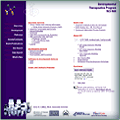Last Updated: 04/25/2012
Establishment of a National Clinical Target Validation Laboratory (Archived Article)
To address the mechanistic gap that occurs because of difficulties in determining the effect of a therapeutic intervention on its putative site of action in patients, in 2005, the DTP Toxicology and Pharmacology Branch was expanded to include NCTVL. This laboratory will elucidate novel methodologies in target tissues specifically applicable to human cancer clinical trials. These methodologies will demonstrate the therapeutic effects of small molecule anticancer agents on specific cellular pathways of interest. The advantages of this crucial endeavor, which will utilize the unparalleled resources of NCI to provide an essential support mechanism for the Institute's national therapeutics development effort, are:
- Provision directly to the intramural and extramural cancer therapeutics and cancer prevention communities of a resource to develop and perform validated procedures on tumor or surrogate tissues for the evaluation of molecularly targeted therapies. These procedures will be exported to the extramural cancer clinical research community as part of NCI's current early therapeutics development program, as well as to the NCI's intramural program, speeding the completion of translational clinical investigations nationwide. NCTVL will utilize small and difficult-to-obtain patient specimens, in advance of patient entry into clinical trials, to develop quality-controlled methodologies for correlative clinical investigations essential to the evaluation of therapeutics efficacy. The laboratory will serve a central core function, performing target validation assays for patients treated within CCR as well as for patient samples from NCI-funded extramural investigators lacking the expertise or facilities to perform such assays.
- Development of procedures allowing extramural investigators with ongoing clinical trials that are part of the current NCI-funded phase I and II program, Cancer Centers, Specialized Programs of Research Excellence (SPOREs), or the cooperative groups to utilize NCI laboratory or clinical resources for the evaluation of molecular targets critical to the completion of their studies. Investigators will access resources through direct patient referral to CCR or by obtaining DCTD support for the development of correlative laboratory procedures for their own investigations.

